Final report for SSC18-001
Project Information
The overall objectives of the 2018-2019 SC SARE Program will be to continue the existing strategic and collaborative planning process for statewide sustainable agriculture development, to provide professional development opportunities for Extension agents, NRCS field staff and other agriculture professionals, reward outstanding service, and to continue to organize and conduct in-service training in sustainable agriculture practices. The MSP Assistant will work with the state SARE coordinators and program advisory committee to organize training activities for 1890 and 1862 Extension and other agriculture professionals that will address critical needs identified by program stakeholders. The program advisory committee met on November 30, 2017 to identify priority topics for the 2018-2019 training program that include: non-chemical approaches to pest management (including information on disease and insect pest life cycles, selection of disease and insect resistant crop varieties, soil pest and disease management); integration of grazing animals in vegetable cropping systems; cost-effective cover cropping for small farming operations; proper harvesting and handling of vegetable crops in the field and packing shed; small equipment repair; organic and non-GMO egg production. Training will focus on an experiential approach to learning where classroom sessions are supplemented with hands-on training in the field. South Carolina State University 1890 Extension will continue to play a key role in planning and will continue to conduct training on sustainable vegetable production with a focus on small-scale and minority owned farms. The MSP position will continue to facilitate program reporting and evaluation, and will assist with project accounting and budgeting. A joint budget for Clemson and South Carolina State University has been developed. Funds will be administered through Clemson; South Carolina State University will submit invoices for training expenses to the Clemson Sustainable Agriculture Program
• Continue the existing strategic planning process for statewide sustainable agriculture development. Building on new and existing collaborations with stakeholder groups, the state co-coordinators will work with the MSP Assistant and with the SC SARE Advisory Committee to broaden the pool of stakeholders including under-represented groups who are involved with the planning process and the development of educational programs. As in previous years, an annual sustainable agriculture open forum and advisory meeting will be organized in fall/winter to identify priorities and to plan educational programs based on a consensus of identified stakeholder needs. We will continue to collaborate on training programs with partner organizations and with SARE PDP personnel from neighboring states when appropriate. The comprehensive and inclusive planning process will limit duplication of effort and will help to leverage available resources.
• Continue to provide professional development opportunities for Extension agents, NRCS, FSA and state Department of Agriculture staff and other sustainable agriculture educators. The outcomes of this objective are that our agriculture professionals will enhance their knowledge and competency in sustainable agriculture, they will increase their contact with the sustainable agriculture community, and they will be recognized as local experts to be called upon for information on sustainable agriculture. Travel scholarships will be provided for select Extension agents and agricultural professionals to attend the 2018 Carolina Farm Stewardship Association (CFSA) Sustainable Agriculture Conference (November) and other sustainable agriculture educational events as funds are available. These events represent valuable educational opportunities for our agents and other agriculture professionals, and also facilitate interactions between agriculture professionals and farmers.
• Continue to support the “Outstanding Sustainable Agriculture Extension Agent of the Year” award to recognize SC cooperative extension personnel for excellence in sustainable agriculture outreach. A call for nominations will be released in summer of each year open to 1890 and 1862 personnel. The award recipient will receive a travel scholarship to attend a sustainable agriculture event and a plaque recognizing their service to the sustainable agriculture community. The award will continue to encourage the development of innovative public outreach programs by our Extension agents.
• The SC SARE PDP Program will continue to organize and conduct in-service training opportunities for Extension agents, NRCS, FSA and state Department of Agriculture personnel, agricultural educators, and for other interested persons as space permits. Workshop topics will be determined annually by the Advisory Committee (see listing of 2018 workshop topics below). The MSP Assistant, in consultation with the coordinators and the SC CFSA representative, will have overall responsibility for workshop organization, publicity and evaluation.
Advisors
Education
Education & Outreach Initiatives
The purpose of this training was to guide participants in developing skills that are key to success in the marketplace, including in harvesting, washing, cooling and packing methods for different types of vegetables that yield a high quality product and minimize food safety risks.
Friday May 4th and Saturday May 5th 2018 at City Roots Farm in Columbia, SC - Based on feedback from previous Wholesale Success trainings, in addition to critical information on best harvest- and post-harvest handling practices to meet market standards, participants gained first-hand experience in the field and processing shed with harvesting and processing various types of vegetables. Produce farmers, market gardeners and Extension Agents and other agriculture professionals who work with vegetable farmers were invited to attend. Extension agents and agriculture professionals were invited to a special supplemental session with instructor Atina Diffley the morning of Saturday, May 5 where she shared tips for teaching the Wholesale Success curriculum. Each participant received a Wholesale Success manual
AGENDA
| Friday, May 4: Meet at City Roots Farm, Columbia, SC | |
| 8:15 AM | Registration (City Roots) |
| 8:30 | Welcome and introduction to the workshop and instructor Atina Diffley |
| 8:45 | Influence of preharvest factors on postharvest quality |
| 9:15 | Harvesting (when to harvest, tools, containers, methods, preventing damage) |
| 9:50 | Break |
| 10:00 | Post-harvest (cooling, curing, cleaning and drying, washing, tools) |
| 11:00 | Sorting, packing, storage and transportation |
| 11:45 | Overview of City Roots operation including post-harvest procedures and infrastructure (Eric McClam) |
| 12:15 | Lunch |
| 1:00 | Travel to the other City Roots vegetable production farm (about 10 min drive) |
| 1:30 | Observe and participate in harvesting a variety of different vegetable crops that will be boxed and transported back to City Roots for processing. Drive back to City Roots. |
| 3:00 | Arrive back at City Roots. Tour of farm and processing facility. Participate in processing different vegetables that were harvested at the other farm. |
| 5-5:30 | Adjourn |
| Saturday, May 5: Meet at City Roots (Optional morning session for Extension agents and other agricultural professionals) | |
|
9-11 AM
|
Atina Diffley will discuss her experiences teaching the Wholesale Success material along with strategies for effective engagement with different audiences. Plenty of time will be available for Q&A and discussion. |
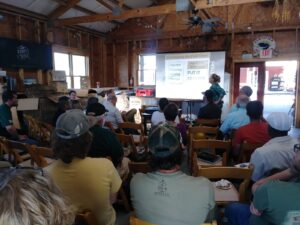
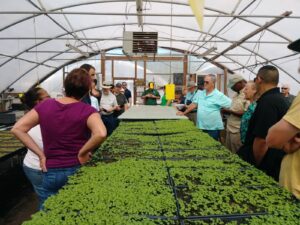
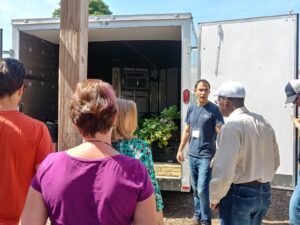
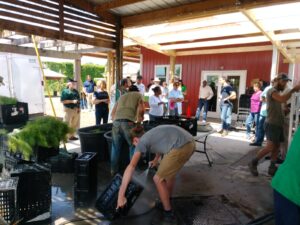
- One full day training and one half day training was organized in the subject area.
- Participants gained practical information on field harvesting and post-harvest handling practices.
- Participants gained first-hand experience in the field and processing shed with harvesting and processing various types of vegetables.
To hold a training and discussion on the importance of pollinators, and considerations for encouraging them to become a natural and permanent resource on the farm.
Thursday May 10th 2018 at Clemson University Student Organic Farm - Apiculture Specialist, Dr. Jennifer Tsuruda, presented on the importance of pollinators, and considerations for encouraging them to become a natural and permanent resource on the farm. Clemson Student Organic Farm manager, David Robb, gave a tour of the farm and provide information on practices in place to encourage and support pollinators. Plenty of time was provided for questions.
AGENDA
8:45 Check in
9:00 Importance of Pollinators (Jennifer Tsuruda)
9:30 Planting Pollinator Forage (Jennifer Tsuruda)
10:30 Management Considerations (Jennifer Tsuruda)
11:00 Tour of Organic Farm and Current Practices that Encourage Pollinators with Q & A (David Robb and Jennifer Tsuruda)
Noon Adjourn
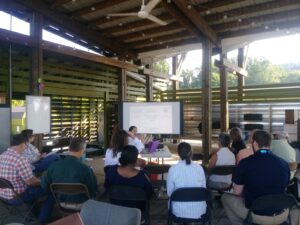
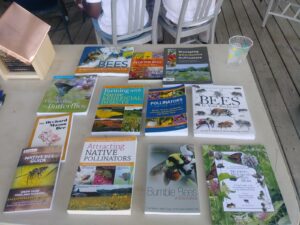
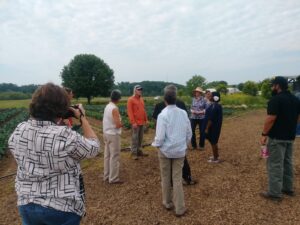
- One half day training was organized in the subject area
- Participants gained practical information on the importance of pollinators on the farm and how to support them.
To discuss learn about the pros and cons of cover cropping and no-till with recommendations based on current research and instructor experiences in the field over the past decade.
May 17th 2018 at the Madren Conference Center and Student Organic Farm - No-till vegetable production offers a more sustainable approach to weed management than the frequent use of herbicides and tillage, and also promotes soil health. Because cover crop based no-till vegetable production involves a different approach to management, growers may be reluctant to transition from conventional tillage without seeing the system in action and knowing its costs and benefits compared with conventional tillage. In this workshop we discussed the pros and cons of cover cropping and no-till with recommendations based on current research and our experiences in the field over the past decade.
AGENDA
| 8:45 | Welcome and Introduction |
| 9:00 - 9:45 | Understanding the influence of cover crops and residue on soil nutrients and vegetable crop fertility (Dr. Bhupinder Farmaha, Asst. Professor and Nutrient Management Specialist, Clemson Edisto Research & Education Center) |
| 9:45-10:45 | What we have learned from organic research on cover cropping and no-till in the U.S. (Dr. Mark Schonbeck, Organic Cropping Systems Specialist and Consultant, Floyd, Virginia) |
| Break | |
| 11:05-11:40 | Results of research in upstate SC to compare different cover crop species mixtures (Ricardo St Aime, Graduate Student, Clemson Dept. of Plant & Environmental Sciences) |
| 11:45- 12:30 | Lessons learned in managing cover crops for no-till vegetable production: Four years of no-till research and vegetable production experience at the Clemson Student Organic Farm (Dave Robb, Clemson SOF Manager and Ph.D. candidate) |
| 12:35 | Travel by car to nearby Clemson Student Organic Farm |
| 12:45 | Lunch, Q&A with instructors and discussion on cover cropping and no-till |
| 2:00 | Tour of cover crop plots and no-till vegetable production |
| 3:00-3:30 | Adjourn |
- One 3/4 day workshop was organized in the subject area
- Participants gained practical knowledge of cover cropping and the benefits and drawbacks of using them.
The PSA Grower Training Course is a way to satisfy the FSMA Produce Safety Rule requirement outlined in § 112.22(c) that requires ‘At least one supervisor or responsible party for your farm must have successfully completed food safety training at least equivalent to that received under standardized curriculum recognized as adequate by the Food and Drug Administration.’
The South Carolina SARE program supported several Produce Safety Alliance trainings in the 2018/19 reporting period through funding support.
Hosted by Clemson Extension Prorgam and South Carolina Department of Agriculture. These trainings were organized for produce growers who must met the requirements of the FSMA Produce Safety Rule. The trainers spent all day teaching the content contained in the following seven modules. In addition to learning about produce safety best practices, key parts of the FSMA Produce Safety Rule requirements were outlined within each module.
- Introduction to Produce Safety
- Worker Health, Hygiene, and Training
- Soil Amendments
- Wildlife, Domesticated Animals, and Land Use
- Agricultural Water (Part I: Production Water; Part II: Postharvest Water)
- Postharvest Handling and Sanitation
- How to Develop a Farm Food Safety Plan
After attending the entire course, participants received a certificate from the Association of Food and Drug Officials (AFDO) that verifies they have completed the training course. To receive an AFDO certificate, a participant must have been present for the entire training and submit the appropriate paperwork to their trainer at the end of the course.
- One full day training event was organized in the subject area
- Producers received necessary training in order to be compliant with Produce Safety Rule.
- Participants received a certificate of completion and were verified by AFDO to have completed the course.
To demonstrate and provide instruction on the use and operation of walk-behind tractor technology to small farmers.
August 9th in Charleston, SC - Farmers looking for a piece of equipment for their farm who don’t have the space or capital to accommodate a ride-on tractor were invite to attend this event. Lowcountry Local First organized this demonstration and tutorial by a local dealer featuring two models of Grillo Walk-Behind Tractors and a number of key implements that might be right for your farm/garden.
Walk-behind Tractor Models Demonstrated:
Grillo 107, Grillo 110
Implements Demonstrated:
Flail Mower, Rotary Plow, Chipper Shredder, Bed Shaper, Tiller, Crimper-Roller
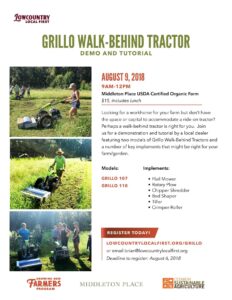
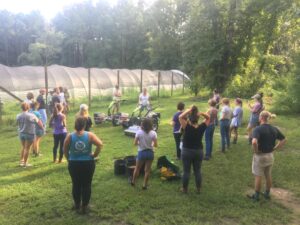
- One half day training was organized in the subject area
- Participants receive practical information and hands on training in the usage and operation of walk-behind tractors for the farm use.
To discuss life cycles of key disease pathogens and insect pests affecting vegetables both above and below-ground and explain how growers may use this information to implement certain cultural management practices that help to prevent or avoid disease and pest problems, and how changes in weather can affect disease and pest development.
August 10th in Charleston, SC - For farmers, successful use of cultural disease and insect pest management methods to prevent and/or avoid problems before they occur depends on an understanding of pathogen and pest life cycles and also how their development may be affected by weather conditions. In this workshop, vegetable disease and insect pest management experts discussed life cycles of key disease pathogens and insect pests affecting vegetables both above and below-ground. They also explained how growers may use this information to implement certain cultural management practices that help to prevent or avoid disease and pest problems, and how changes in weather can affect disease and pest development. The workshop concluded with a session on selection and application of organic insecticides for use in vegetables.
PESTICIDE RE-CERTIFICATION CREDITS
Participants needing SC re-certification credits can earn 5 core credits for this class. If you have more than one license you will need to register each license when you arrive. Please come prepared with your license number(s) to receive credit.
AGENDA
| 9:00 AM | Welcome and Introduction |
| 9:10 | Life cycles of key insect pests of vegetables and strategies to prevent and avoid infestation and damage: Part 1 (Dr. Rebecca Schmidt-Jeffris) |
| 10:10 | Life cycles of economically important disease pathogens of vegetables and preventative controls (Dr. Tony Keinath) |
| 11:10 | Break |
| 11:25 | Life cycles of key insect pests of vegetables and strategies to prevent and avoid infestation and damage: Part 2 (Dr. Rebecca Schmidt-Jeffris) |
| 12:25 PM | Lunch |
| 1:15 | Influence of weather on vegetable disease development and implications for management (Dr. Tony Keinath) |
| 2:15 | Selection and application of insecticides approved for use on organic vegetables (Dr. Rebecca Schmidt-Jeffris) |
| 3:15 | Q&A and adjourn |
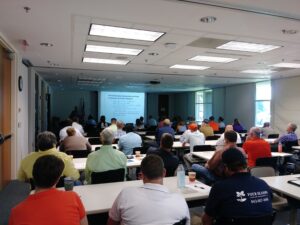
- One 3/4 day training was organized in the subject area
- Participants gained practical information related to identification and treatment of disease and insect pest issues in vegetable production.
- Participants had the opportunity to earn 5 core pesticide re-certification credits for attending this training
- Participants received guidance on the use and application of organic pesticides.
To learn about how to assess soil health on the farm, the practices that support it, and why it’s important.
August 13th at Clemson Student Organic Farm in Clemson, SC - In this training we covered the basics of how soil fertility, physical properties, and soil biology are related, and discussed a variety of management strategies that promote soil health, including what researchers at Clemson have learned from years of no-till research. We toured research plots at Clemson’s Student Organic Farm, and demoed soil sampling techniques and key organic no-till equipment. We’ll also cover different soil testing methods, and discuss which might be right for your farm.
AGENDA
8:30 - 9:00 Registration & Introductions
9:00 - 9:45: Soil Health Concepts
9:45 - 10:30: Cover Crops for No-Till Production: What we’ve learned from research (David Robb)
10:30 - 10:45: Break
10:45 - 11:15: Tour of cover crop and no-till plots at the SOF with time for Q&A
11:30 - 12:15: Soil Testing and Techniques for Assessing Soil
12:15-12:30 Wrap-up and adjourn
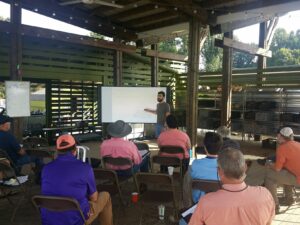
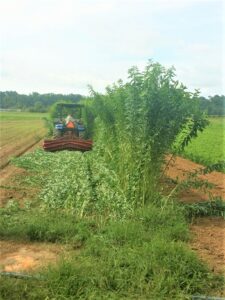
- One half-day training was organized in the subject area.
- Participants obtained practical knowledge and advice on cover cropping and soil health
To teach the short-term benefits of cover crops, how to reduce input costs through soil testing, and the latest findings from soil health research projects across the state.
October 19th 2018 in Eastover, SC - This workshop for farmers and natural resource professionals focused on soil health in conventional soybean, corn, cotton, and peanut rotations. During the morning classroom sessions at Eastover Park, participants learned to optimize the short-term benefits of cover crops, how to reduce input costs through soil testing, and the latest findings from soil health research projects across the state. After lunch, the group traveled to nearby Carter Farms to see a standing cover crop and learn cover crop management and soil sampling techniques. Presenters included:
- Dr. Rachel Vann, NC State University Assistant Professor & Soybean Extension Specialist
- Dr. Buz Kloot, USC Research Professor and Crop Advisor
- Dr. Bhupinder Farmaha, Clemson University Assistant Professor and Nutrient Management Specialist
- Gordon Mikell, USDA-NRCS State Agronomist
- Jason Carter, Farmer
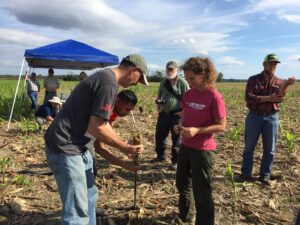
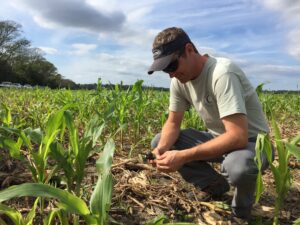
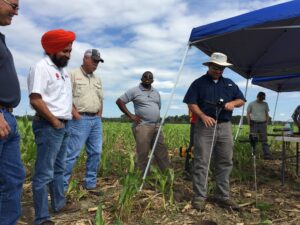
- One 3/4 day training was offered in the subject area
- Participants gained practical knowledge of soil health in conventional soybean, corn, cotton, and peanut rotations.
1. To convene stakeholders in the sustainable agriculture industry in South Carolina to discuss needs and prioritize training topics for the upcoming year.
2. To collect input on preference for training in sustainable agriculture from our public stakeholders.
3. To review critical issues, challenges, and needs related to sustainable agriculture development in South Carolina.
4. To identify and prioritize sustainable agriculture training needs that can be addressed with available funding from SARE and other sources.
5. To develop a plan for educational/training programs to be organized in the following year to address the critical issues that are identified
December 5th 2018 in Clemson, SC - The public was invited to the annual Open Forum on Sustainable Agriculture to discuss critical issues, challenges and needs related to Sustainable Agriculture development in South Carolina. The meeting was open to all South Carolina farmers, educators, policy makers, state and federal government and non-governmental agricultural agency personnel, and other South Carolina citizens with an interest in sustainable agriculture.
The Open Forum meeting was held on the 5th of December 2018 at the Clemson University Outdoor Lab in Clemson, SC. The Clemson location was chosen this year after a survey of our stakeholders identified that being a preferable location.
After the Open Forum, the SC SARE state advisory committee meeting met to prioritize training topics discussed earlier that day. Each SC SARE advisory member receives an invitation to the annual South Carolina Sustainable Agriculture Research and Education (SC SARE) Advisory Committee meeting.
AGENDA
| 8:45 - 9:30 | Check in (Coffee and refreshments served) |
| 9:30 - 9:40 | Introduction and welcome (Dr. Geoff Zehnder) |
| 9:40 - 10:05 | Group introductions (Individuals representing other organizations will have an opportunity to briefly discuss new or ongoing initiatives) |
| 10:05 - 10:25 | Review of 2018 programs and accomplishments (Geoff Zehnder) |
| 10:25 - 11:35 | Open discussion on issues relating to sustainable agriculture development in South Carolina. Where should we put program resources in 2019? (Facilitated session) |
| 11:35 - 11:45 | Break |
| 11:45 - 12:30 | Continue discussion to prioritize issues and Adjourn |
| 12:30 - 1:30 | Local Foods Lunch and adjourn Open Forum Meeting |
| 1:30 - 4:30 | SC SARE Advisory Committee Meeting (AC Members) |
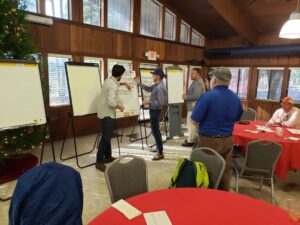
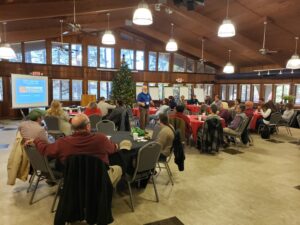
- 1 half day Open Forum meeting was organized and held at a centralized location in the state where stakeholders came and provided valuable input for developing future training initiatives.
- 1 half day SARE Advisory Committee meeting was held to prioritize training activities for 2019
- Ag professionals and farmers from around the state were given an opportunity to share information with the group about program activities which facilitated networking and collaboration.
1. Review farm activities relating to winter preparations
2. Tour the farm and facilities
3. Provide relevant information on resources for participants for their own farm businesses
January 5th 2019 in Clemson, SC - Each season presents a unique set of responsibilities for farmers planning for success on their farms. Come tour the Clemson University Student Organic Research Farm and learn about what the farm manager, Dave Robb, and crew are doing to pack up the farm for winter and prepare for the 2019 growing season. This workshop is intended to provide insight into the day to activities in a diversified vegetable operation specific to this time of year. In this training we will discuss winterization of irrigation systems, “thinking ahead” for the upcoming growing season, cover crop planning/planting, ground preparation, planting plans, and prioritizing your ‘down time’ in the winter.
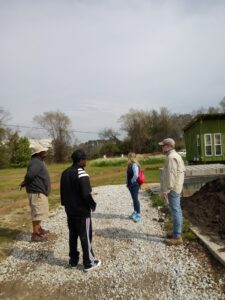
- One half day event was organized in the subject area
- Participants reviewed farm activities relating to winter preparations and toured the farm and facilities
- Participants were provide relevant information on resources for their own farm businesses
To provide training for new farmers on how to take an interpret soil tests.
December 18th 2019 in Clemson, SC - Clemson Soils lab manager, Shannon Alford, and Area Extension Specialist, Kerrie Roach, provided detailed information on how to take a soil sample, interpret the results and make decisions on soil amendments based on those results during this class. Participants who had a soil test done already were invited to bring it along for interpretation. Other examples of soil tests were available to review as well during the training.
AGENDA
6:00pm – Arrive (Introductions)
6:10 – Tour of Soil Lab (Shannon Alford)
6:30 – Taking a Soil Test and Reading the Results (Shannon Alford)
7:15 – How to Interpret Results for Best Farming Practices (Kerrie Roach)
7:50 – Questions
8:15 – Adjourn
- One 2 hour evening session was organized in the subject area
- This training was in partnership with the South Carolina New and Beginning Farmer Rancher program which facilitates opportunities for new farmers to find the information and resources they need. There were 4 SCNBFR Program participants at this event.
- Participants gained practical knowledge of how to take a soil sample, interpret the results and make decisions on soil amendments based on those results.
To provide foundational information on how to create an online presence for your farm business with guidance on several popular methods.
March 1 2019 in Clemson, SC - Participants learned about various online platforms that they can use to promote and expand their farm business with instruction from Clemson University’s Public Service and Agriculture division communicator, Donna Bowen. This training was catered to the specific needs of the participants as identified through a survey of all registrants. Topics included website development, a social media overview, how to create a social media marketing plan, analytics, and Facebook advertising.
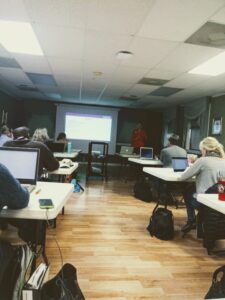
- One 3/4 day training was organized in the subject area
- Participants gained practical knowledge about various online platforms that they can use to promote and expand their farm business.
- This training was in partnership with the South Carolina New and Beginning Farmer Rancher program which facilitates opportunities for new farmers to find the information and resources they need. There were 12 SCNBFR Program participants in attendance at this event.
1. Review farm activities relating to spring/early season production
2. Tour the Student Organic Research Farm and facilities
3. Provide relevant information for participants for their own farming operations
March 30th 2019 in Clemson, SC - Each time of year presents a unique set of responsibilities for farmers planning for success on their farms. Participants toured the Clemson University Student Organic Research Farm and learned about what the farm manager, Dave Robb, and crew were doing to prepare for upcoming vegetable production for the 2019 growing season. This workshop provided insight into the day to activities in a diversified vegetable operation specific to this time of year. In this training we discussed care and maintenance of irrigation systems, “thinking ahead” for the growing season, cover crop planning/planting, bed preparation, planting plans, and prioritizing your time.

- One half day event was organized in the subject area
- Participants reviewed farm activities relating to spring preparations and toured the farm and facilities
- Participants were provide relevant information on resources for their own farm businesses
To provide training on growing cover crops in sandy soils
April 3rd 2019 in Columbia, SC - This training was organized by the Richland Soil and Water Conservation District and sponsored in part by the SC SARE Program.
Agenda
9:00am Registration
9:15am Welcome Chanda Cooper, Richland SWCD, Dr. Cory Heaton, Clemson Sandhill REC, Dr. Kathy Coleman, Clemson Sandhill REC
9:30am Introduction to Cover Crops & Rainfall Simulator Gordon Mikell, USDA-NRCS
10:00am Cover Crop Demonstration Plot Tour Cody Bishop, Clemson Sandhill REC
10:45am Break
11:00am Cover Crops and Weed Management Dr. Michael Marshall, Clemson Edisto REC
11:30am Cover Crops and Soil Moisture Benefits Dr. Jose Payero, Clemson Edisto REC
12:00pm Lunch Mike Morrow, Hilda Catering
12:40pm Sponsor Remarks Carl and Caleb Coleman, Little Mill Seed, Kelly Flynn, Clemson SARE, Blanchard Equipment, Gary Ward, SC Forage & Grazing Lands Coal.
12:45pm New Research: Cover Crops in Sandy Soils Dr. Bhupinder Farmaha, Clemson Edisto REC
1:15pm Teaser: Cover Crops and Soil Health Dr. Rongzhong Ye, Clemson Pee Dee REC
1:30pm Cover Crop Benefits: Reports from the Field Charles Davis, Clemson Extension
1:50pm Q&A and Conclusion Kenny Mullis, Richland SWCD
2:00pm Dismissal
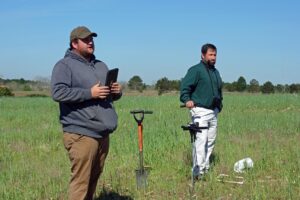
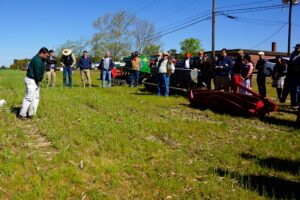
A day-long field day was held at the Sandhill REC in Columbia, SC.
Participants received a broad tutorial in cover crops and associated management practices with a special emphasis on sandy soils.
To learn how and why to farmscape your property with beneficial insects in mind.
Beneficial insects are an important part of on-farm integrated pest management. During this workshop, Clemson Professor of Entomology Dr. Carmen Blubaugh discussed the importance, identification, biology, and conservation of beneficial insects, including pollinators and the natural enemies of pest insects.
USDA-NRCS District Conservationist Josh Martin shared information about USDA-NRCS programs to assist with pollinator and beneficial insect habitat enhancement.
6:00pm Welcome, Announcements, Invocation - Yvonne Kling
6:40pm Farmscaping for Beneficial Insects - Dr. Carmen Blubaugh
7:40pm USDA-NRCS Support for Beneficial Insects - Josh Martin
8:00pm Evaluations and Dismissal - Sonya Terry
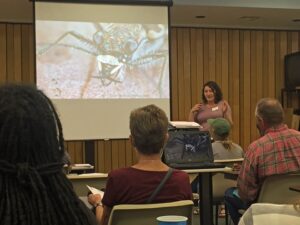
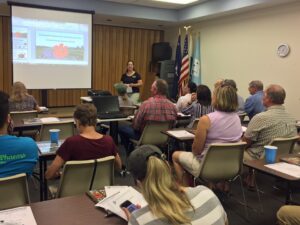
- One 2 hour evening event was organized in the subject area
- Participants gained practical knowledge of farmscaping for and supporting beneficial insects.